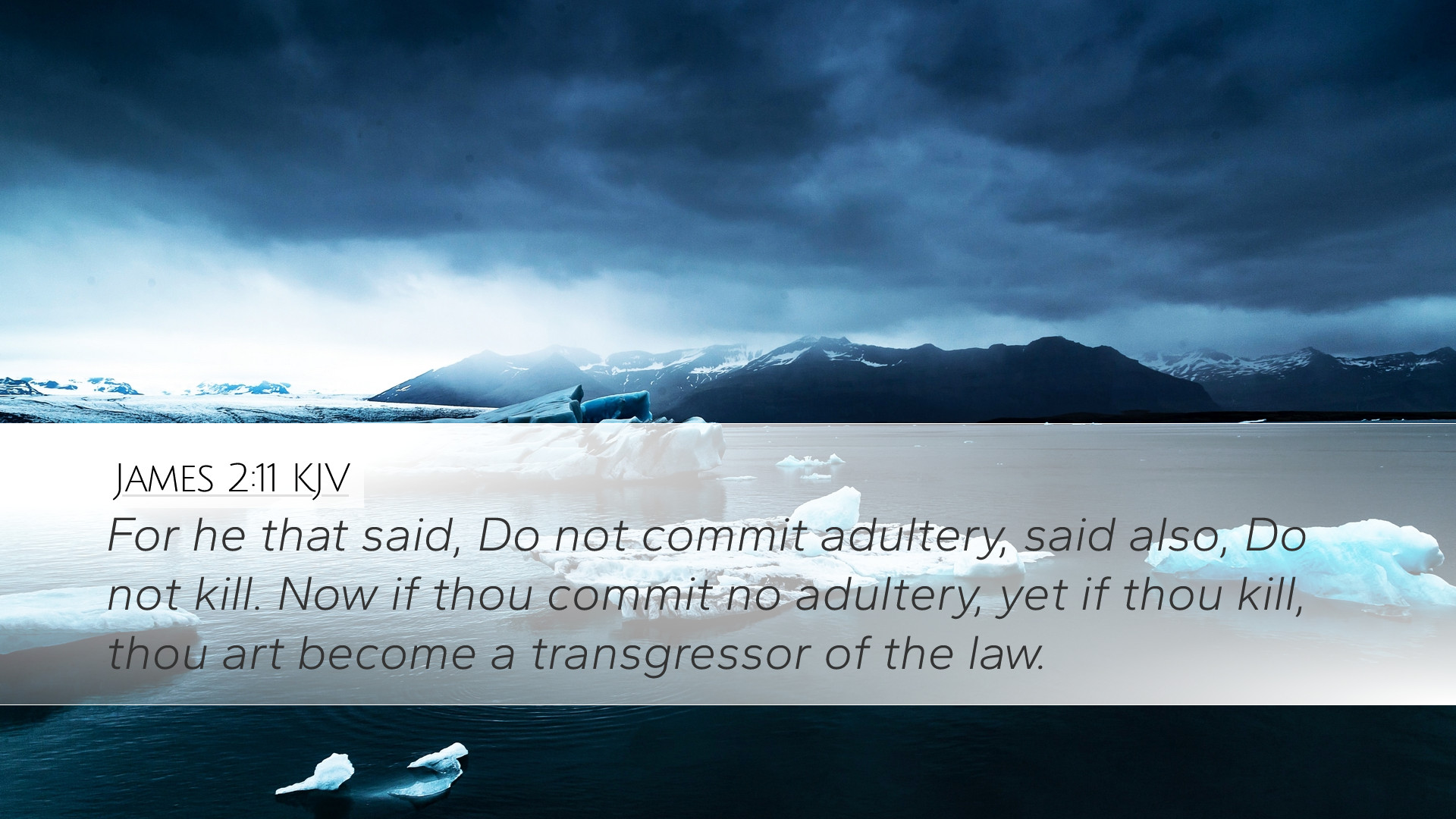Old Testament
Genesis Exodus Leviticus Numbers Deuteronomy Joshua Judges Ruth 1 Samuel 2 Samuel 1 Kings 2 Kings 1 Chronicles 2 Chronicles Ezra Nehemiah Esther Job Psalms Proverbs Ecclesiastes Song of Solomon Isaiah Jeremiah Lamentations Ezekiel Daniel Hosea Joel Amos Obadiah Jonah Micah Nahum Habakkuk Zephaniah Haggai Zechariah MalachiJames 2:11
James 2:11 KJV
For he that said, Do not commit adultery, said also, Do not kill. Now if thou commit no adultery, yet if thou kill, thou art become a transgressor of the law.
James 2:11 Bible Commentary
Commentary on James 2:11
The verse James 2:11 states: "For he who said, 'Do not commit adultery,' also said, 'Do not murder.' If you do not commit adultery but do murder, you have become a transgressor of the law." This highlights the nature of the law and the comprehensive call to holiness that it embodies. This commentary combines insights from public domain texts, aiming to provide depth for pastors, students, theologians, and scholars.
Overview of the Verse
In this passage, the Apostle James aims to illustrate the seriousness and interconnectivity of God's commandments. By presenting two major violations of the law—adultery and murder—James underscores that breaking any commandment constitutes sin. Thereby, he dismantles the notion that some sins are lesser than others, affirming that all transgressions hold equal weight in the eyes of divine justice.
Historical Context
Understanding the context of James' audience—a mix of Jewish and Gentile Christians—is vital for interpreting this verse. This letter addresses issues of favoritism and social disparities within the Church. By citing the Old Testament laws, James speaks directly to those familiar with the Scriptures, urging them to consider the broader implications of their conduct and the unity of God’s moral requirements.
The Nature of the Law
Matthew Henry asserts that the commands given by God are not arbitrary; they derive from His holy nature. The law is divine, and thus, to violate any part—be it adultery or murder—is to disobey the very character of God. Each commandment not only carries moral weight but also reveals the divine expectation of a pure and holy life.
Albert Barnes explains that the law was presented not merely as a set of prohibitions but as a holistic standard of righteousness. When James links adultery and murder, he emphasizes the interconnectedness of sin. Failure to uphold one precept shows a disregard for the others, resulting in a complete transgression of the law.
The Principle of Accountability
Adam Clarke discusses the implications of being a "transgressor of the law." The term denotes a willful neglect or violation of the law's stipulations. Clarke suggests that those who think they can uphold certain laws while neglecting others fall under the guilt of breaking the entire law.
James’ use of the terms ‘do not commit adultery’ and ‘do not murder’ serves to illustrate how easily one might assume personal righteousness based on selective adherence to the commandments. This fundamentally challenges the heart of the moralist and religious legalist within us.
Relation to Favoritism
This verse contextually follows James' admonitions against favoritism, which calls into question the integrity and seriousness with which believers apply the law. If one can disregard even a small commandment while adhering to others—such as showing partiality—they demonstrate a grave misunderstanding of divine law's comprehensive nature.
Henry articulates that showing favoritism illustrates a blatant disregard for the royal law of love that underlies all commands. James reminds believers that love is fulfilled when all commandments are kept, thus reiterating that no one should consider themselves above another due to their adherence to a segment of the law.
The Unity of God’s Commandments
This passage invites immense theological reflection. The unity of God’s commandments promotes a holistic understanding of obedience, where love for God manifests in a conscientious following of His moral law. Barnes notes that the unity of the commands discourages complacency; it fosters a culture of integrity where the believer matures not only in a single area of conduct but in their entire ethical life.
The call to live consistently according to the entirety of God's commands is a vital message for pastors and educators in the church. It advocates for a thorough explication of holiness that not only instructs but also encourages congregants toward a life wholly surrendered to God’s will.
Application for Contemporary Faith
The exhortation James provides carries significant import in contemporary faith contexts. It encourages believers to evaluate their lives against the standard of the law not merely on a surface level but rather in its entirety. Clarke warns that neglecting one commandment while upholding another creates an illusion of righteousness that ultimately leads to spiritual ruin.
- Holistic Orthodoxy: Pastors must promote an integrated expression of faith that encapsulates love, grace, and moral integrity.
- Consistent Witness: Believers are a living testament of God’s grace; thus, their lives should reflect a consistent adherence to His commands.
- Community Accountability: Encouraging congregational accountability equipped with love and respect, underscoring the importance of upholding each other in righteousness.
Concluding Thoughts
James 2:11 serves as a powerful reminder of the continuity and unity found within God’s law. This passage compels believers to recognize the seriousness of all transgressions and to strive for holistic obedience. As clergy, scholars, and students of Scripture engage with this verse, it becomes a pivotal text in our understanding of grace, law, and the character of God.
In reflection, the poignant words of James remind us that to view the commands of God selectively is to miss the greater truth of His expectations for His people. The message resonates deeply, inviting a call to deeper holiness and a unified life of integrity.


